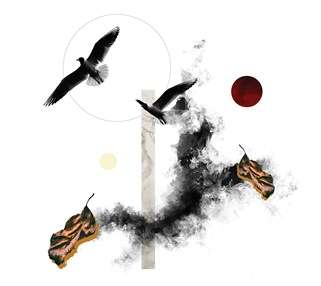|
Back
Les Enfants Terribles Showcases Glass Omaha
The Mastercraft Building at Millwork Commons
04/03/2019 - & April 5, 7, 13, 14*, 2019
Philip Glass: Les Enfants Terribles
Adrian Kramer (Gérard/Narrator), Naomi Louisa O’Connell (Dargelos/Agathe), Theo Hoffman (Paul), Vanessa Becerra (Elisabeth), Shauna Davis, Chris Emile, Lindsey Matheis, Charbel Rohayem (Dancers)
Maureen Zoltek, Eric Andries, Bryan Stanley (pianos), David Bloom (Conductor)
James Darrah (Director), Yuki Izumihara (Set Design), Camille Assaf (Costume Design), D.M. Wood (Lighting Design), Gustavo Ramirez Sansano/TITOYAYA (Choreography)

ONE Festival artistic director, James Darrah, directed Philp Glass’s Les Enfants Terribles (1996), moving out from the propulsive music in a rush. Glass’s gorgeous score is performed on three pianos, which sit in front of the stage. The stage is a slightly raised platform in a ‘found’ space in Omaha, Nebraska, the site of Omaha Opera’s annual festival. We know Omaha as a hotbed of business invention. Warren Buffett makes his home there. Omaha Steaks is among the opera’s long-term supporters. It turns out Omaha residents have an appetite for the new in art. The Glass opera was packed at every performance. This mysterious and disturbing psychodrama based on a Jean Cocteau novel, unfolds on stage in song, dance and spoken word.
Placing the three piano performers on the first line puts Glass’s music where it should be: the thumping bass chords and delicate arpeggio figures at the upper reaches of the keyboard creating surround sound in the space. Music underscores the cruel suffering of a brother and sister as they play "The Game" of who can hurt who more first. Always moving forward, never stopping for an aria, the opera compels us to conclusion.
Meeting with his collaborators to begin the project, Darrah said, "No beds," to everyone’s relief. Prior productions have made explicit the incestuous relationship between Paul and Lise. Darrah gives us a more daring yet subtle vision. Incestuous impulses are left to our imagination by music and movement.
Vanessa Becerra sings the role of Lise with a forceful ferocity. Her wide range is remarkable. Urgent and calculating, she consumes everything around her, with fixed attention on destroying her brother Paul, crippled early on by a snowball in which his friend Dargelos has embedded a rock. Lise’s dancing doppelgangers extend her reach, their movements sometimes shadows on the rear stage wall. Figures enlarge and retreat in outline. Gestures are moving in both the dancers and the singer, adding emphasis at crucial moments.
Paul is memorable in a long yellow robe and a pink one too. Costume designer Camille Assaf wraps all the performers in arresting garb to reflect the disturbing tale. Sung by tenor Theo Hoffman, Paul is given spine by a bright edge to the voice. His collapse is marked, but he persists in playing with his sister to the end.
Naomi Louisa O’Connell sings both Dargelos, the snow ball thrower, and Agathe, Paul’s love interest. Paul is attracted to Agathe because she resembles Dargelos, his initial love interest. Agathe gets Lise into the fashion business. Struts along a fashion catwalk are taken by dancers and singers, bringing us into one of the many worlds suggested by the story.
The set may be simple. Yet it feels just right for the complicated, dangerous story, created in a film in 1950 directed by Jean-Pierre Melville. Whirling dancers, crouches, spins, springs, attacks and withdrawals rush by us. Director Darrah has a special talent for enriching production and encouraging performance at just the right pace. He does not signal in advance, but his specific takes are often followed by an aha moment.
‘The Game" played in the opera is one of torture, each sibling trying to best the other by acts ever more cruel and destructive. The opera ends when Lise is driven crazy by dying Paul, not because he is dying, but because he will die first. She shoots herself and beats him into the end zone.
Glass reminds us that we are looking at an old story by seeding his music with references to J.S. Bach and Antonio Vivaldi. The Greek Gods Zeus and Hera were brother and sister and husband and wife. Abraham married his half sister Sarah in the Bible. We are enjoined against doing this in Leviticus. Modern understanding of genetics explains why. Yet the long history of incest in art suggests that this game is one we desire to play, even when it is prohibited. Incest is not best, but Omaha Opera and James Darrah’s production shows us why it both intrigues and repels.
Susan Hall
|